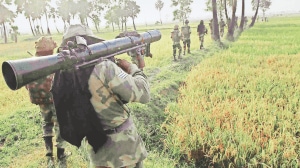It’s the silly season of policy statements
Is it the beginning of the silly season? When the silly season begins, it never rains — it pours. I refer to the election fever that ha...

Is it the beginning of the silly season? When the silly season begins, it never rains — it pours. I refer to the election fever that has gripped the leading political parties, especially the BJP, and the flood of policy statements.
Prime Minister Atal Behari Vajpayee, on a visit to Kashmir, announced that he was ready to extend the hand of friendship to Pakistan. That was interpreted as a bold, new initiative on the part of the Government of India. Was it really a change of tack and, if so, what prompted the change? Actually, nothing.
Vajpayee’s offer was conditional on the cessation of ‘‘cross-border terrorism’’. Since Pakistan has never admitted — nor will it ever admit — that it had sponsored either cross-border terrorism or infiltration, the whole thing was a non-starter. Soon, it was clarified that there was no offer of talks at all and the Prime Minister was inclined to take one step at a time.
The next twist in the drama was the Prime Minister’s statement in the course of an interview to a German newspaper that, if his initiative failed, he would ‘‘retire’’. Retire from what? When the Prime Minister ‘‘clarified’’ his statement and said that he had used the word with reference to himself, he only deepened the mystery.
The third — and, so far, the last — twist to the tale came when Vajpayee told an audience in Germany that he hoped that the new initiative would lead to a suspension of cross-border terrorism. So, was the Prime Minister dropping the pre-condition of cessation of cross-border terrorism? No one is sure.
If the BJP thinks that all these bits and pieces make a policy, they are wrong. Policy is not — and ought not to be — made in this fitful manner. A stray comment or the choice of an inapt word or a smile can never be a substitute for a well-thought out policy based on solid preparation and analysis of the background to a problem, the options before the decision-maker and the reasons for the final choice of option.
I welcome the decision of the Prime Minister — if he had indeed taken one — to make a new beginning. Having taken that decision he should have instructed his advisers to prepare a detailed paper setting out the options.
The options should have been first discussed in the Cabinet and, thereafter, the leaders of the principal Opposition parties should have been taken into confidence. It is then that he should have made a carefully drafted statement that did not leave any room for speculative interpretations.
Contrast Vajpayee’s approach with that of Prime Minister Ariel Sharon of Israel regarding the ‘‘roadmap’’ put forward by the United States. Contrast also with Prime Minister Tony Blair’s approach to joining hands with the US in the war against Iraq. Both sought approval of their Cabinets, both justified their decisions before their Parliaments and both elaborately explained their approach to their people. That is the way a liberal democracy works.
The Congress and the Left parties are justified in their criticism that the Central government’s ‘‘policy’’ statements are inconsistent and contradictory. If the demand for a complete stoppage of cross-border terrorism before talks with Pakistan has been the cornerstone of India’s policy since the attack on Parliament House on December 13, 2001, has that policy been given up? If so, why was it given up and why was it, in the first place, the centrepiece of the policy?
In my view, the original formulation itself was wrong. The disputes between India and Pakistan cannot be resolved if the two countries do not talk to each other. And if the two countries will not talk to each other unless one of the issues — cross-border terrorism — is resolved in a particular way, there will never be any talks. This was the flaw in the ‘‘policy’’ of the government so far. Nevertheless, this flawed policy appealed to the right-wing of the BJP leadership, its rank and file and to the extremist elements of the Sangh Panivar such as the Vishwa Hindu Parishad (VHP).
The usefulness of the policy — if there was any — has run its course. Elections are around the corner. There is no way that Vajpayee can move forward if he clung to that policy. Vajpayee finds himself obliged to appeal to a larger constituency. Hence, the stray remark, the ambiguous clarification and the enigmatic smile.
Everyone can read — or misread — whatever he wants into these statements. The hapless Venkaiah Naidu became a victim of his own garrulousness when he proposed the construction of a mosque along side a Ram Temple in Ayodhya. He even invited Muslims to join the BJP in large numbers so that there could be more Muslim Ministers in Vajpayee’s cabinet. (I wonder what Venkaiah Naidu will do if Muslims actually joined the BJP in large numbers. My hunch is he will lose his job). When Venkaiah Naidu found that he had perhaps opened his mouth too wide, he promptly disowned his remarks.
Such is the stuff of politics that even reasonable heads tend to lose their composure on the eve of elections. Take for example Chandrababu Naidu, the Chief Minister of Andhra Pradesh. After being a strong votary of difficult reforms and good governance for nearly five years, Naidu has now promised everything (loans, subsidies, handouts) to everybody under the sun that shines over Andhra Pradesh.
The Congress is not far behind. Madhya Pradesh Chief Minister Digvijay Singh and Rajasthan Chief Minister Ashok Gehlot are toying with ideas that they did not consider particularly relevant during the four-and-a-half years that they have been in office since the last elections.
In my assessment, if the BJP does well (that means two out of four States) in the next round of State elections, it will call the Parliamentary elections sooner than scheduled. If the BJP does badly (none or only one out of four), it will be branded as a lame-duck government and the Opposition will demand early elections.
Either way, Parliamentary elections seem certain in February-March 2004. A little bird whispers in my ear that there is another possibility — the elections to four States may be pushed back by three months and held simultaneously with Parliamentary elections in February or March 2004. So, be prepared for more ‘‘policy’’ statements.
Write to pcexpressindia.com



- 01
- 02
- 03
- 04
- 05




























